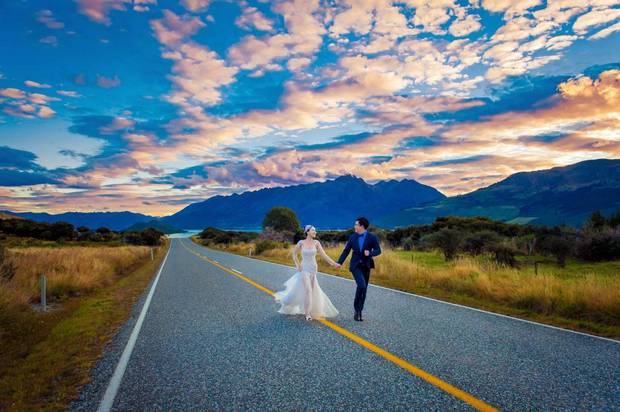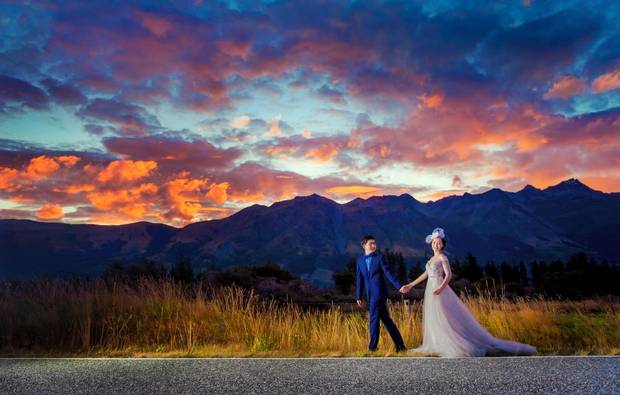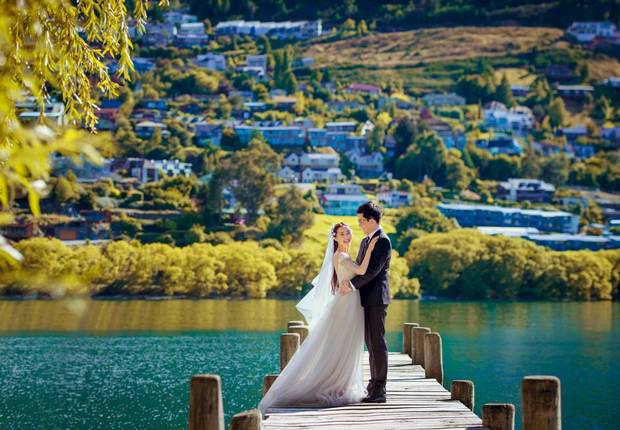
Bride Peng Yuqi and her betrothed Wang Yuchen travelled to New Zealand to take wedding photos in beautiful landscapes they knew from Hollywood. For some Chinese couples, wedding photos are meant to show social prestige as much as their love for each other.
Handout
The video opens with a drawn-out violin note, its sound cascading over an old-fashioned telephone on a desk beside a stack of books. Most prominent among them is The 10Ks of Personal Branding, a self-help tome that promises to teach "how to focus your life's goals with your life's actions to create a powerful package called 'you.'"
In this pitch for Chinese wedding photographers, the camera then cuts away to show what "your" life might look like. A feathered pen, ready to ink a massive deal. Gleaming marble floors. Whisky swirling in a crystal glass, gems sparkling in jewelled necklaces. A series of rooms that evoke, respectively, French monarchy, Greek aristocracy and the wood-beam luxury of a billionaire's Montana ranch.
In the gilded Beijing studios of Golden Ladies Photo, any of these can be the place where couples consummate what is, for many, the most important part of the wedding: the photos.
i Do: A promotional video for a Beijing studio shows even the lowest on the economic ladder can be transformed into a member of the private jet set
2:26
With a day in front of a camera and a series of costume changes, even the lowest on the economic ladder can be transformed into a member of the private jet set. Their home apartments may be tiny, their bank accounts slim. But the photos on their walls – and, sometimes, ceilings – will be magnificent.
And this year, couples are posing for them far more than usual. Chinese numerology suggests 2013 (with a three that sounds like "break-up), 2014 (with a four that sounds like "death") and 2015 (with a five that sounds like "nothing") were all inauspicious years to get married.
Sixteen, on the other hand, sounds like "lucky and smooth" – and so customers are flooding into the country's estimated 400,000 wedding photography shops, some of which are keeping doors open day and night on weekends.
At certain 24-hour shoots, couples pose for images that staff will then heavily Photoshop and print in sizes large enough to stretch across the headboard of a marital bed. Others pay for a full photographic team – including a makeup artist, videographer and wardrobe manager – to fly with them to a Scottish castle, a South African game park or a New Zealand mountain vista, where they can snap pictures in a distant idyll before returning to their smoggy homes.
The Bentleys and Ferraris that roar down big-city streets in China provide some of the most obvious evidence that growing numbers of Chinese have become fabulously rich. Even moderate wealth, however, remains far beyond the grasp of most.
In China, "life, in fact, is quite mediocre," said Li Yinhe, a prominent Chinese sociologist and sexologist. Wedding photos offer a chance for "ordinary people to look like princesses and princes – to let them experience that nobility and beauty."
It's just a part of the enormous Chinese wedding industry, now worth an estimated $170-billion per year, roughly equivalent to the entire Canadian energy sector.
The industry has grown fast. In the 1950s, under Mao, couples might give each other books containing the Chairman's writings and celebrate with a modest feast of candies, sunflower seeds and peanuts. As China opened in the 1970s, couples came to expect watches, bicycles and a sewing machine, according to a recent report in Time Weekly, a Guangzhou newspaper. By the 1980s, they wanted a rental car, pictures and furniture. In the 1990s and 2000s, demands expanded to include far more, including electronics, cars and, of course, elaborate photo sessions.
With most photographers, wedding photo package prices today range from $1,000 to almost $100,000 – the latter nearly enough to hire Annie Leibovitz for a day.

Peng Yuqi (right) and Wang Yuchen in New Zealand. “I heard its landscapes were beautiful, and many movies were filmed there,” she said.
Handout
Most wedding photos are taken months in advance, producing images that can be printed on invitations, displayed at the ceremony and plastered around a newlywed's house. One couple "painted a giant picture onto the ceiling of their bedroom, like wallpaper, so they could see it when they lay down," said Han Yufeng, an assistant general manager in Beijing at one of the busiest offices for Golden Ladies photo, which has 470 locations around the world – including one in Toronto.
Last year, 13,000 couples came to Ms. Han's office for photos; this year, the tally has risen dramatically.
She admits that for some grooms, who spend most of the day waiting for their brides to switch makeup and costumes, "it's quite torturous." For men, the company has special waiting rooms equipped with magazines, movies and drinks – although "we definitely don't provide alcohol," she says.
On their busiest day so far, 157 couples took pictures in one of several 50,000-square-foot studios whose interiors outdo all but the poshest of hotels or luxury homes, and are refreshed every few months to keep with the most current fashions. The company operates 24 hours a day on weekends, with a separate office for the Photoshop artists who spend hours digitally polishing each image.
Wedding-photo oneupmanship has led to a litany of bizarre choices: growing numbers of couples are getting married in Antarctic. One couple took pictures with the groom in Nazi gear, complete with a bright red swastika armband and, in one picture, a German shepherd. One couple was photographed with the groom in SWAT gear, brandishing an assault rifle. An octogenarian couple dressed up in costumes ripped from a movie poster for the 2015 Disney film Cinderella.
"To some Chinese, wedding photos are meant to show their love – but they are more the epitome of wealth and mianzi," the maintenance of face and social prestige, said Ji Yuting and He Tao, a couple who are midway through a year-long wedding photo trip around China.
Ms. Ji and Mr. He are taking photos dressed as each of the country's 56 officially-recognized minority groups. They see their nation-spanning photo trip as the expression of a new generation embracing new freedoms.
"We are more interested in figuring out what kind of life we want to live, what dreams we have and how to make them real," the couple wrote by e-mail. "That's not like our parents' generation, whose primary goal was a stable lifestyle just like everybody else."
James Poborsa, a University of Toronto lecturer, sees something else: The modern incarnation of the "staged scene," a defining feature of Communist Chinese photography.

Peng Yuqi (left) and Wang Yuchen spent $6,000 for the one-day wedding shoot in New Zealand, not including travel costs.
Handout
Under Mao, state-sponsored photographers "produced more politicized or propagandizing images. All of them were more or less staged scenes," said Mr. Poborsa, who is writing a PhD titled "Staging the future: the politics of photographic representation in post-socialist China."
The idea was to "create an image foreshadowing an idealized future" – which sounds a lot like how most couples see their wedding photos.
"People who see my photos really want to get married," says Lin Song, a Beijing-based wedding photographer.
Ms. Lin's wedding photography has taken her around the world and across China. In South Africa, she photographed a couple standing beside a giraffe and, in another frame, petting a leopard. In Tibet, she worked at an altitude so high she was on oxygen while she snapped. Many couples travel to places to which they have no connection – crossing the planet solely to take photos.
"It's all about beauty," said Ms. Lin. "We Chinese have seen too much of the Great Wall in Beijing. People want to choose something special for themselves that they do not often see."
One of her clients, Peng Yuqi, flew her to New Zealand. "I heard its landscapes were beautiful, and many movies were filmed there," said Ms. Peng, who lives in Melbourne. "I've always wanted to take pictures in such a beautiful place."
The cost: $6,000 for a single-day shoot, not including travel costs for the couple or Ms. Lin's four-person team.
For Ms. Peng, it was a chance to capture not just herself and fiancé in the beauty of youth, but also the feelings of young love. In one of her favourite photos, they are jogging down an empty asphalt road, in front of a horizon ringed with mountains that plunge to turquoise waters.
"In his eyes, he has so much love for me. You can see it," Ms. Peng said. "I really love that photo."
With reporting by Yu Mei and Alex Migdal